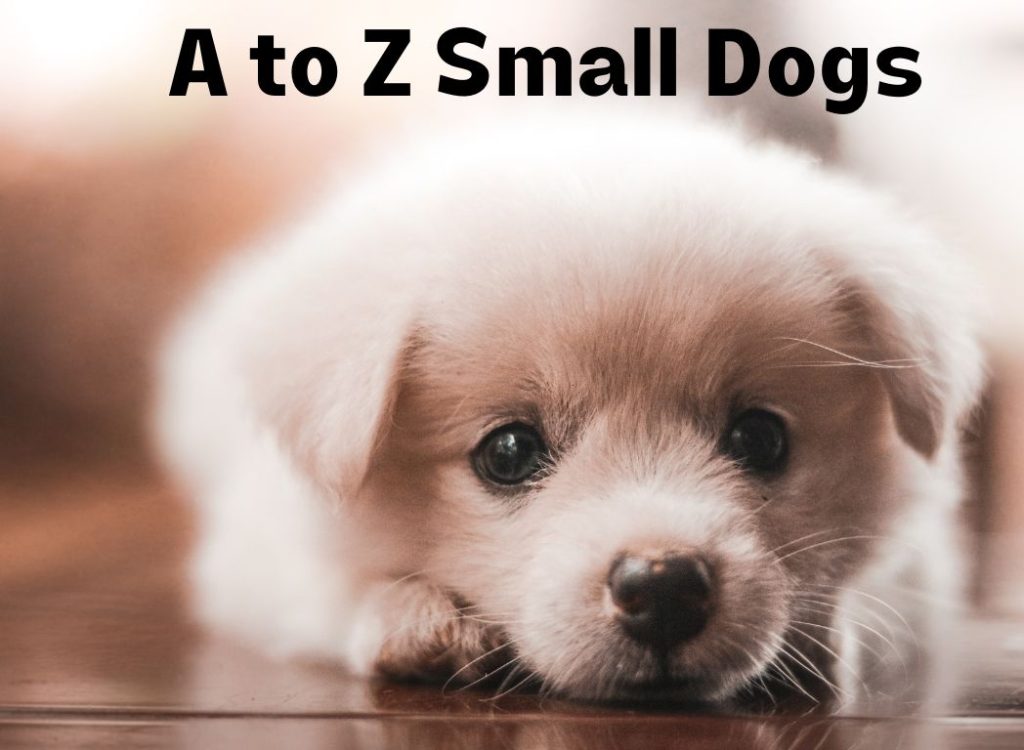Are you dreaming of a pint-sized pup to bring joy to your life? Look no further than this A to Z List of Small Dog Breeds! Whether you’re captivated by cuddly companions or energetic explorers, this guide unveils a world of furry friends waiting to steal your heart.
Inside, you’ll discover a comprehensive collection of small dog breeds, each bursting with unique personalities, appearances, and needs. From the feisty and fearless Chihuahua to the playful and fluffy Pomeranian, we’ll unveil the list of all small a to z perfect pup for every lifestyle.
List of Small Dogs: A to Z

Affenpinscher:
Location: Germany
Color: Black, gray, silver, or tan
Food: Requires a balanced diet with high-quality dog food
Special: Known for their monkey-like appearance and lively personality
Bichon Frise:
Location: France/Belgium
Color: White
Food: Requires a balanced diet with high-quality dog food
Special: Known for their fluffy white coat and cheerful disposition
Cavalier King Charles Spaniel:
Location: United Kingdom
Color: Various colors, including Blenheim, tricolor, ruby, and black & tan
Food: Requires a balanced diet with high-quality dog food
Special: Known for their affectionate nature and gentle temperament
Dachshund (Miniature):
Location: Germany
Color: Various colors, including red, black & tan, and chocolate
Food: Requires a balanced diet with high-quality dog food
Special: Known for their long body and short legs, as well as their bold and curious personality
English Toy Spaniel:
Location: United Kingdom
Color: Various colors, including Blenheim, King Charles, Prince Charles, and Ruby
Food: Requires a balanced diet with high-quality dog food
Special: Known for their affectionate and gentle nature, as well as their distinctive domed head
French Bulldog:
Location: France
Color: Various colors, including brindle, fawn, white, and pied
Food: Requires a balanced diet with high-quality dog food
Special: Known for their bat-like ears, wrinkled face, and affectionate personality
Griffon Bruxellois:
Location: Belgium
Color: Various colors, including red, black & tan, and black
Food: Requires a balanced diet with high-quality dog food
Special: Known for their distinctive Brussels Griffon breed “griffon” appearance and expressive eyes
Havanese:
Location: Cuba
Color: Various colors, including white, black, and parti-colors
Food: Requires a balanced diet with high-quality dog food
Special: Known for their silky coat, lively personality, and friendly disposition
Italian Greyhound:
Location: Italy
Color: Various colors, including fawn, blue, black, and white
Food: Requires a balanced diet with high-quality dog food
Special: Known for their slender build, graceful movement, and affectionate nature
Japanese Chin:
Location: Japan
Color: Various colors, including black & white, red & white, and black & tan
Food: Requires a balanced diet with high-quality dog food
Special: Known for their distinctive oriental appearance, silky coat, and aristocratic demeanor
Klee Kai:
Location: United States (developed in Alaska)
Color: Various colors, including black, gray, and red
Food: Requires a balanced diet with high-quality dog food
Special: Known for their striking resemblance to Siberian Huskies, despite their smaller size
Lhasa Apso:
Location: Tibet
Color: Various colors, including gold, cream, and parti-colors
Food: Requires a balanced diet with high-quality dog food
Special: Known for their long, flowing coat and independent yet loyal nature
Maltese:
Location: Malta
Color: White
Food: Requires a balanced diet with high-quality dog food
Special: Known for their luxurious white coat and affectionate personality
Norfolk Terrier:
Location: United Kingdom
Color: Various colors, including wheaten, red, and black & tan
Food: Requires a balanced diet with high-quality dog food
Special: Known for their wiry coat, fearless disposition, and affectionate nature
Papillon:
Location: France/Belgium
Color: White with patches of color (butterfly-like markings)
Food: Requires a balanced diet with high-quality dog food
Special: Known for their distinctive butterfly-like ears and energetic personality
Quinton Terrier:
Location: United Kingdom
Color: Various colors, including black, tan, and blue & tan
Food: Requires a balanced diet with high-quality dog food
Special: Known for their compact size, wiry coat, and lively disposition
Russian Toy:
Location: Russia
Color: Various colors, including black & tan, red, and blue & tan
Food: Requires a balanced diet with high-quality dog food
Special: Known for their elegant appearance and lively, affectionate nature
Also check this :Are Electric Fences Safe for Small Dogs?
Shih Tzu:
Location: China
Color: Various colors, including gold, white, and black
Food: Requires a balanced diet with high-quality dog food
Special: Known for their long, flowing coat and affectionate, outgoing personality
Toy Fox Terrier:
Location: United States
Color: White with black and/or tan markings
Food: Requires a balanced diet with high-quality dog food
Special: Known for their small size, short coat, and spirited, intelligent nature
Yorkshire Terrier:
Location: United Kingdom
Color: Blue and tan
Food: Requires a balanced diet with high-quality dog food
Special: Known for their long, silky coat and confident, affectionate personality
Zuchon:
Location: United States (crossbreed)
Color: Various colors, including white, cream, and apricot
Food: Requires a balanced diet with high-quality dog food
Special: Known for their fluffy coat, affectionate nature, and friendly disposition
How to Define Small Dogs? What are small Dogs?
Small dogs are generally considered to be dog breeds that reach a mature weight of under 20 pounds (9 kg). This is a loose definition though, as some breeds might be a bit bigger but have a slender build and still be considered small.
Characteristics of Small Dogs:
Small dogs exhibit several distinctive characteristics that set them apart from their larger counterparts:
Size: Small dogs are characterized by their petite stature, typically weighing under 20 pounds. Their compact size makes them easily manageable and portable, whether traveling or simply navigating around the home.
Adaptability: Small dogs are highly adaptable creatures, able to thrive in a variety of living environments. They can comfortably adjust to apartment living or smaller homes, making them popular choices for urban dwellers or individuals with limited living space.
Needs: Small dogs have relatively modest requirements in terms of exercise space and food compared to larger breeds. While they still require regular physical activity and mental stimulation to stay healthy and happy, their smaller size means they generally need less space to roam and play. Similarly, their smaller appetites mean they consume less food, resulting in lower feeding costs and less storage space required for supplies.
Additionally:
Small dogs can live in a variety of habitats, including homes, apartments, and even some yards. They are not suited for living outdoors all the time, as some small breeds are more susceptible to cold weather than larger dogs.
Small dogs typically eat a diet of kibble or canned food that is formulated for their size and activity level. It is important to feed your small dog a high-quality diet to ensure that they get the nutrients they need to stay healthy.
Overall, small dogs can be wonderful companions for people of all ages and lifestyles. If you are considering getting a small dog, be sure to do your research to choose a breed that is a good fit for your home and lifestyle.
Final Thoughts:
Small dogs offer a unique combination of size, adaptability, and manageable needs, making them well-suited companions for a wide range of individuals and households. Whether snuggling on the couch or exploring the great outdoors, these pint-sized pups bring joy and companionship to their owners in a compact package.
There are many reasons why people choose small dogs. Small dogs can be:
Easy to care for: Small dogs tend to eat less food and require less exercise space than larger breeds.
Adaptable: Small dogs can easily live in apartments or small homes.
Good companions: Small dogs can be just as loving and loyal as large dogs.
Small dogs can live in a variety of habitats, including homes, apartments, and even some yards. They are not suited for living outdoors all the time, as some small breeds are more susceptible to cold weather than larger dogs.
Small dogs typically eat a diet of kibble or canned food that is formulated for their size and activity level. It is important to feed your small dog a high-quality diet to ensure that they get the nutrients they need to stay healthy.
Overall, small dogs can be wonderful companions for people of all ages and lifestyles. If you are considering getting a small dog, be sure to do your research to choose a breed that is a good fit for your home and lifestyle.
Certainly! Here are some details about each of the small dog breeds listed:

